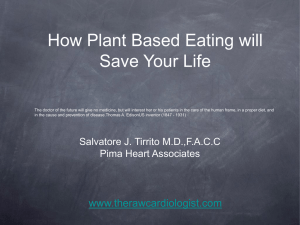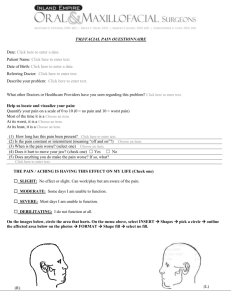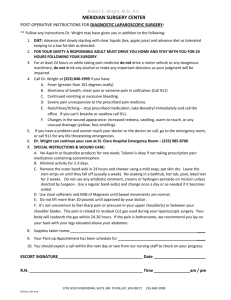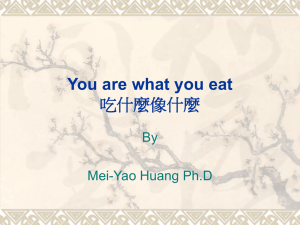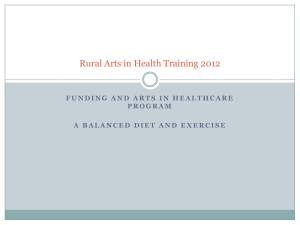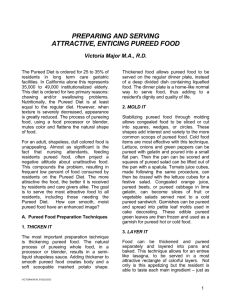Gastric Sleeve Resection
advertisement
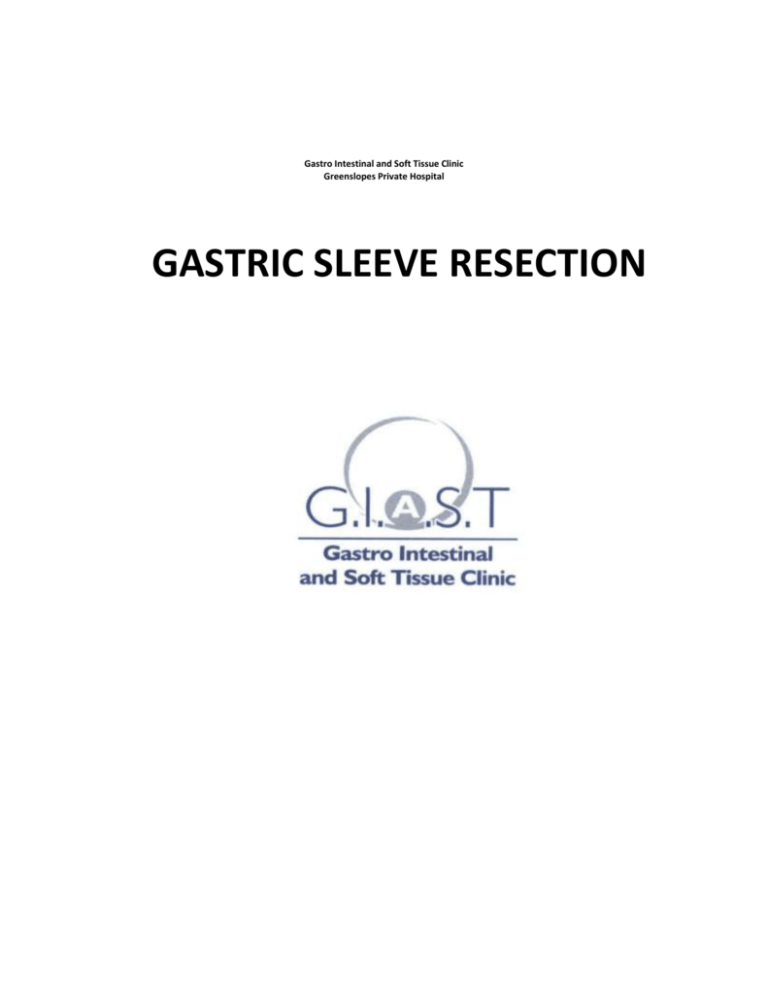
Gastro Intestinal and Soft Tissue Clinic Greenslopes Private Hospital GASTRIC SLEEVE RESECTION YOUR OPERATION - WHAT IS IT? Sleeve Gastrectomy, is a purely restrictive bariatric operation. It involves converting the stomach from a large sac (2 litres) to a tube (200ml). Weight is lost because of early satiety due to the smaller volume stomach. Figure 1. A narrow Stomach Tube is created and the outer part of the stomach removed WHAT TO EXPECT AFTER YOUR OPERATION POST OPERATIVE PERIOD Most patients are transferred to the ward after surgery, although in some cases you may spend the first night in the Intensive Care Unit. This is to provide a more monitored environment for those with severe sleep apnoea, cardiac conditions or other existing health concerns. Your family can visit you here although restrictions apply. Pain Management: You will have a PCA (Patient Controlled Analgesia) to provide post operative pain relief. Your nurse will regularly monitor your pain level. Be sure to notify your nurse if your pain remains uncontrolled or you have nausea. Mobilisation: You will be asked to sit up and dangle your legs over the edge of the bed four (4) hours after the operation. Your nurse will assist you but you will be required to move by yourself. Walking and sitting out of bed are vital activities to assist your recovery and will decrease your chances of post-op complications. You will be encouraged to do deep breathing and leg exercises whilst in bed. Nutrition: Day of operation: You may have ice to suck to keep your mouth moist. Day One: You can start having sips of water to drink. Day Two: Your diet will increase to full fluids today. This diet includes clear soup, jelly, custard, milk and cordial. Remember to take VERY SMALL SIPS and start with a teaspoon. All your medications can be taken by mouth but tablets often need to be crushed. Day Three: Today you may take any type of liquid. You should drink very slowly. When you sense fullness, STOP. At Home: It is important to maintain an active life. You will do better and reduce your risk of complications if you are working towards getting back to normal quickly. Try to walk at least 5 blocks each and every day. No other exercises are encouraged at this time. Please do not drive for the first week. Remember to drink a lot of fluids but avoid soft drinks. Aim for at least 1 litre of water per day. LIFE AFTER A SLEEVE GASTRECTOMY After your operation you may experience some of the following: Dizziness: Occasionally you may feel light headed. This is due to the fact that you are not drinking as much liquid as you were able to before surgery; therefore the volume in your body is reduced. When this occurs do not panic. If you can find a comfortable place to sit or lie down, do so. Your body will adjust and the blood will be redistributed adequately after a short interval. Aim to drink 1.5 litres of fluid per day. Altered Bowel Habits: Bowel habits may be altered after the surgery. In the beginning, you may have watery bowel movements. Do not expect your bowel movements to be regular until you start eating solid food. For most, bowel habits should become regular and you should have one bowel movement every day and usually less in quantity than you are used to. Vomiting: During the two months after surgery, you will probably experience a few episodes of vomiting. It is important to remember your new stomach is approximately 200ml and can be easily overwhelmed. You must eat slowly and stop when you feel full. Meals will take up to 45 minutes. Vomiting can occur due to too fast eating, poor chewing and inappropriate food. Too much vomiting or retching will cause secondary swelling and possible obstruction of the passageway. Nausea: Nausea is a side effect of any gastric operation. This problem may start on the third day after the operation or a couple of weeks after discharge from hospital. This is a side effect of the operation that is responsible for some of the massive rapid weight loss. Even though you may experience severe nausea you should make an effort to eat at least three to four small meals a day and drink at least three to four cups of water a day. Anorexia: Anorexia, complete lack of appetite or forgetting to eat, is a problem some patients experience. This is dangerous. Make an effort to eat at least three to four meals a day. Hypoglycaemia: Light headedness, passing out and running heart beat are typical of hypoglycaemia. This is due to your not eating at regular intervals as recommended. Do not go for more than six hours without eating. GENERAL DIET GUIDELINES Initially patients are on a pureed diet for 3 weeks, but as the operation settle, the diet can progress to normal consistency of healthy choices. Patients get used to eating three small meals a day, approximately 25% of previous serves. When going to a restaurant they can eat an entrée sized meal and feel satisfied. The key point being that a small meal satisfies hence the experience is different to dieting and therefore sustainable in the long term. Apart from a commitment to healthy eating no foods are specifically banned. Snacking especially with junk foods is to be avoided, as it will greatly negate the effects of the surgery. NUTRITIONAL ADVICE AFTER YOUR SURGERY A sleeve gastrectomy procedure reduces the size of your stomach. This means you will feel full and satisfied after a small amount of food. Initially the volume of food that can be eaten is very limited and you may also experience intolerances towards certain foods. Therefore, eating a well balanced diet is essential in preventing any nutritional deficiencies and also gaining the maximum benefit from your surgery. Compliance to the suggested diet in the first 6 months is very important to ensure adequate nutrition in this phase of rapid weight loss. As the surgical site heals you will be able to eat a ‘normal’ diet. After 6 months most people can tolerate normal meals and eat 3 small meals including most of the food groups. Diet after Surgery: Stage 1 Fluids: You may have clear fluids one day after your operation. These include water, cordial, soup, jelly, fruit juice, tea and coffee. On days 2-3, your diet is progressed to Free Fluids, which includes all items on clear fluids as well as milk, drinking yoghurt, thicker-style vitamised soups and custard. Do not attempt to eat all the food provided. Eat and drink very slowly and stop when you feel full. Stage 2 Puree Diet: From 3-4 days after surgery you may have a puree diet. Everything you eat should be a smooth, pureed consistency. You need to continue with this diet when discharged for 3 weeks. When you tolerate this diet, without any pain, reflux or indigestion, you may progress to a soft diet. For each stage of the diet it is important to: Have small meals, chew your food well, eat slowly, and stop when you are full. PUREE DIET Breads and Cereals Quick/instant porridge or semolina Spaghetti or noodles or rice (well cooked) AVOID BREAD, BISCUITS, SEMI COOKED PASTA AND RICE Fruit and Vegetables Pureed, tinned or stewed fruit (with no added sugar) Vegetable juice Mashed potato, pumpkin, squash, carrot, zucchini Pureed cauliflower, peas, corn or other vegetables AVOID STRINGY FRUIT, FRUIT SKINS AND RAW VEGETABLES Dairy Products (3 serves per day) Drinking yoghurt (maximum 200ml per day) Low fat or calorie reduced yoghurt (1 tub of 200g per day) AVOID ICE-CREAM, MILKSHAKES AND FLAVOURED MILKS Meat, Fish, Poultry, Eggs, Legumes (2 serves per day = 50g of pureed meat) Eggs – try scrambled or poached Pureed lean meat (lamb, pork, veal, chicken) Meat that has been stewed or casseroled is suitable to puree Mash softly cooked beans and legumes – try adding to soups and casseroles Tuna/Salmon AVOID FATTY OR FRIED MEATS SOFT DIET Breads and Cereals Quick/ instant porridge or semolina Weetbix (soaked in low fat milk) Sago, Tapioca Spaghetti or noodles or rice (well cooked) Couscous Toast AVOID FRESH OR SOFT BREAD Fruit and Vegetables Soft ripe, tinned or stewed fruit (with no added sugar) Vegetable juice Soft cooked vegetables AVOID STRINGY FRUIT, FRUIT SKINS AND RAW VEGETABLES Dairy Products (3 serves or more per day) Skim or low fat milk (maximum 250ml per day) Low fat or calorie reduced yoghurt (1 tub of 200 grams per day) AVOID ICE CREAM, MILKSHAKES AND FLAVOURED MILKS Meat, Fish, Poultry, Eggs, Legumes (2 serves per day) Eggs – try scrambled or poached Lean minced Meat (lamb, pork, veal, chicken), add to casseroles and mornays Soft, marinated fish, canned Tuna/ Salmon Well cooled beans and legumes – try adding to soups and casseroles AVOID FATTY OR FRIED MEATS GENERAL RECOMMENDATIONS Meal Size: After the surgery you will not be able to eat large amounts of food and fluid at one tie. Having small frequent meals will help prevent pain, discomfort, nausea and vomiting. You should stop eating when you feel full or experience discomfort. Choosing a Balanced diet: As mentioned earlier, you will only be able to eat a small amount of food at one time. Therefore, once you are ready to progress to more solid foods it is important to include foods from all food groups to ensure your diet is balanced and adequate in all nutrients. Protein: Protein is important in preserving your muscle. You should eat protein foods first at each mealtime. Fluids: Fluids are important in preventing dehydration and also help keep your bowels regular. It is important to drink plenty of water (6-8 glasses per day) Avoid large amounts of fluids with meals. Drink 30 minutes before or after meals Avoid soft drinks and high calorie drinks such as cordials, milkshakes or sports drinks Alcoholic beverages: Alcoholic beverages such as wine, beer, spirits, sherry and port have no nutritional benefits and are also very high in energy. It is best to limit these beverages. Fibre: Fibre is important to keep your bowels regular. If constipation is a problem as a result of your restricted diet, discuss this with your Doctor/ dietitian. Exercise: Successful weight control is a result of healthy eating AND regular exercise. The best type of exercise is one you can enjoy and can continue to do on a regular basis. Exercise will help you to improve or maintain your weight loss, increase your metabolism and also improve your general health.

